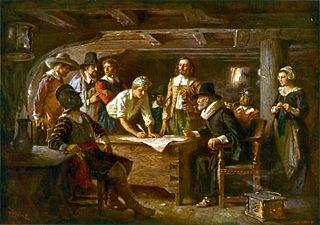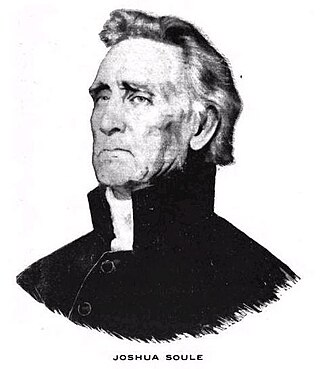Related Research Articles

John Alden was a crew member on the historic 1620 voyage of the Mayflower which brought the English settlers commonly known as Pilgrims to Plymouth Colony in Massachusetts. He was hired in Southampton, England as the ship's cooper, responsible for maintaining the ship's barrels. He was a member of the ship's crew and not a settler, yet he decided to remain in Plymouth Colony when the Mayflower returned to England. He was a signatory to the Mayflower Compact.

The Pilgrims, also known as the Pilgrim Fathers, were the English settlers who traveled to America on the Mayflower and established the Plymouth Colony in Plymouth, Massachusetts. The Pilgrims' leadership came from the religious congregations of Brownists, or Separatists, who had fled religious persecution in England for the tolerance of 17th-century Holland in the Netherlands.

The Mayflower Compact, originally titled Agreement Between the Settlers of New Plymouth, was the first governing document of Plymouth Colony. It was written by the men aboard the Mayflower, consisting of Separatist Puritans, adventurers, and tradesmen. Although the agreement contained a pledge of loyalty to the King, the Puritans and other Protestant Separatists were dissatisfied with the state of the Church of England, the limited extent of the English Reformation and reluctance of King James I of England to enforce further reform.

Christopher Latham Sholes was an American inventor who invented the QWERTY keyboard, and, along with Samuel W. Soule, Carlos Glidden and John Pratt, has been contended to be one of the inventors of the first typewriter in the United States. He was also a newspaper publisher and Wisconsin politician. In his time, Sholes went by the names C. Latham Sholes, Latham Sholes, or C. L. Sholes, but never "Christopher Sholes" or "Christopher L. Sholes".

Edward Winslow was a Separatist and New England political leader who traveled on the Mayflower in 1620. He was one of several senior leaders on the ship and also later at Plymouth Colony. Both Edward Winslow and his brother, Gilbert Winslow signed the Mayflower Compact. In Plymouth he served in a number of governmental positions such as assistant governor, three times was governor and also was the colony's agent in London. In early 1621 he had been one of several key leaders on whom Governor Bradford depended after the death of John Carver. He was the author of several important pamphlets, including Good Newes from New England and co-wrote with William Bradford the historic Mourt's Relation, which ends with an account of the First Thanksgiving and the abundance of the New World. In 1655 he died of fever while on an English naval expedition in the Caribbean against the Spanish.

William Brewster was an English official and Mayflower passenger in 1620. He became senior elder and the leader of Plymouth Colony, by virtue of his education and existing stature with those immigrating from the Netherlands, being a Brownist.

Alexander Henderson was a Scottish theologian, and an important ecclesiastical statesman of his period. He is considered the second founder of the Reformed Church in Scotland. He was one of the most eminent ministers of the Church of Scotland in the most important period of her history, namely, previous to the middle of the seventeenth century.
John Howland was an English indentured servant who accompanied the English Separatists and other passengers when they left England on the Mayflower to settle in Plymouth Colony. In later years, he was an executive assistant and personal secretary to Governor John Carver.

James Chilton was a Leiden Separatist passenger on the historic 1620 voyage of the ship Mayflower and was the oldest person on board. Upon arrival in the New World, he was a signer of the Mayflower Compact. James Chilton was one of the earliest to die that winter, perishing within the following month.

Richard Warren was one of the passengers on the Pilgrim ship Mayflower and a signer of the Mayflower Compact.

George Soule was a colonist who was one of the indentured servants on the Mayflower and helped establish Plymouth Colony in 1620. He was one of the signers of the Mayflower Compact.
William West was an American militia general in the American Revolutionary War, Justice of the Rhode Island Supreme Court, Deputy Governor of Rhode Island, and anti-federalist leader. West also was a party in the first U.S. Supreme Court decision in 1791, West v. Barnes.

Joshua Soule was an American bishop of the Methodist Episcopal Church, and then of the Methodist Episcopal Church, South.

The Five Articles of Perth was an attempt by King James VI of Scotland to impose practices on the Church of Scotland in an attempt to integrate it with those of the Church of England. This move was unpopular with those Scots who held Reformed views on worship, and with those who supported presbyterian church governance.

The global spread of the printing press began with the invention of the printing press with movable type by Johannes Gutenberg in Mainz, Germany c. 1439. Western printing technology was adopted in all world regions by the end of the 19th century, displacing the manuscript and block printing.

The New Jersey State Library, based in Trenton, New Jersey, was established in 1796 to serve the information needs of New Jersey's Governor, Legislature and Judiciary. The State Library is also responsible to assist in the provision of library and information services to all New Jersey residents. The State Library is an affiliate of Thomas Edison State University and is located in the Capitol Complex in Trenton.

The Myles Standish Burial Ground in Duxbury, Massachusetts is, according to the American Cemetery Association, the oldest maintained cemetery in the United States.

Richard More was born in Corvedale, Shropshire, England, and was baptised at St James parish church in Shipton, Shropshire, on 13 November 1614. Richard and his three siblings were at the centre of a mystery in early-17th-century England that caused early genealogists to wonder why the More children's father, believed to be Samuel More, would send his very young children away to the New World on the Mayflower in the care of others. It was in 1959 that the mystery was explained. Jasper More, a descendant of Samuel More, prompted by his genealogist friend, Sir Anthony Wagner, searched and found in his attic a 1622 document that detailed the legal disputes between Katherine More and Samuel More and what actually happened to the More children. It is clear from these events that Samuel did not believe the children to be his offspring. To rid himself of the children, he arranged for them to be sent to the Colony of Virginia. Due to bad weather, the Mayflower finally anchored in Cape Cod Harbor in November 1620, where one of the More children died soon after; another died in early December and yet another died later in the first winter. Only Richard survived, and even thrived, in the perilous environment of early colonial America, going on to lead a very full life.
Moses Simonson, also known as Moyses Simonson or Symonson or Moses Simmons, was one of the earliest settlers of New England as one of the passengers of 1621 Fortune voyage and would have been present at the time of the Pilgrims First Thanksgiving in 1621. According to several sources, Moses Simonson, may have had Jewish ancestry.
Edward Raban was an English soldier in the Eighty Years War and Anglo-Spanish War, who became a printer chiefly associated with Aberdeen, Scotland. Raban may have been involved in the publication of the Perth Assembly, a controversial book opposing religious reforms of James VI.
References
- ↑ Soule Kindred Newsletter, Vol.43 No.4, Autumn 2009, pg 4 https://soulekindred.org/resources/Documents/Newsletters/PDF-Newsletters/Vol.-43-No.-4-Autumn-2009.pdf
- ↑ Stewart, Laura A. M. (2007). "The Political Repercussions of the Five Articles of Perth: A Reassessment of James VI and I's Religious Policies in Scotland". The Sixteenth Century Journal. 38 (4): 1013–1036.
- ↑ Soule Kindred Newsletter, Vol.43 No.4, Autumn 2009, pg 4 https://soulekindred.org/resources/Documents/Newsletters/PDF-Newsletters/Vol.-43-No.-4-Autumn-2009.pdf
- ↑ Soule Kindred Newsletter, Vol.43 No.4, Autumn 2009, pg 4 https://soulekindred.org/resources/Documents/Newsletters/PDF-Newsletters/Vol.-43-No.-4-Autumn-2009.pdf
- ↑ Soule Kindred Newsletter Vol. XXXXV, No. 4 Fall 2011 https://soulekindred.org/resources/Documents/Newsletters/PDF-Newsletters/Vol.-45-No.-4-Fall-2011.pdf